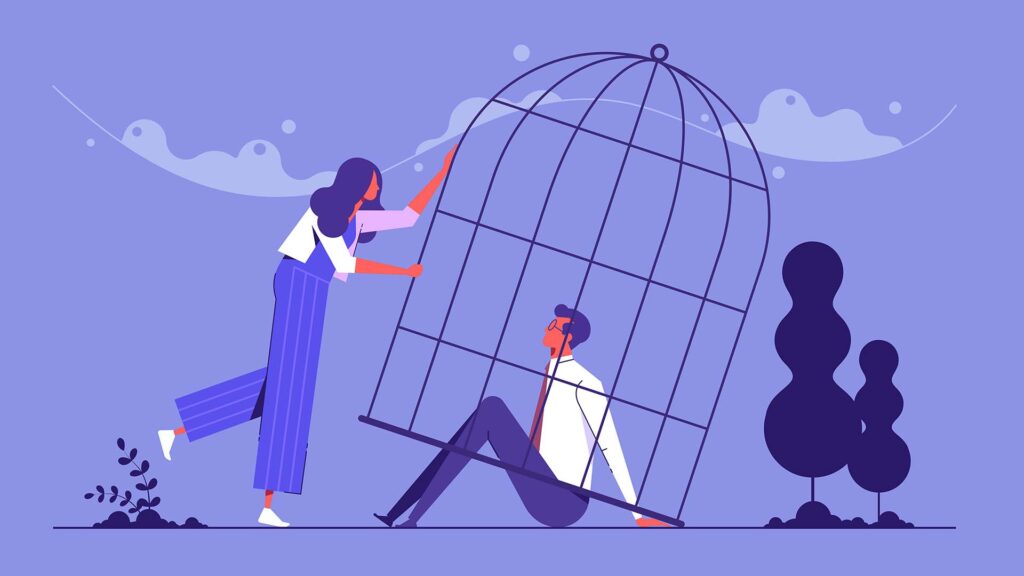Coming out…again!

Dr Chris McLeod reflects on how similar his experiences have been in ‘coming out’ as gay and coming out as having a lifelong invisible disability of agoraphobia. But which one has been a more difficult coming out experience?
“Oh my goodness, I would never have known!”
“Bless you, that must have been difficult to keep in.”
“Thanks so much for sharing, that’s really brave of you.”
I remember coming out as gay when I was 18 like it was yesterday. All the previous years of hiding my emotions, of trying to fit into social norms, of thinking I was ill or wrong, all building up to that one moment when I told people for the first time.
Now I seem to be going through the same thing all over again, with people saying really similar things – it’s just 16 years later, and it’s about having an invisible disability.
I have lived with agoraphobia since I was seven years old. Agoraphobia is an anxiety disorder characterised by an intense fear and avoidance of situations where leaving or escaping might be difficult, or where help wouldn’t be available if things go wrong. Many people assume agoraphobia is a fear of open spaces, but it’s actually a more complex condition, affecting people in many different situations.

I live with this every day. At work, I can feel intense difficulty in such simple situations for many, such as being in an in-person meeting or bumping into someone in a corridor or outside. In my home life, I want the ground to swallow me up in queues at the bank, I have to sit near an exit in the cinema, and I find it difficult to go around the supermarket. I try to challenge myself when I feel I can – my partner kindly bought me a ‘medal’ (keyring…) for walking from the back to the front exit of St Peter’s Basilica, even if it did take me 45 minutes to move from the doorway and I did have tears streaming down my face. However, it’s always a hard balance to strike between challenging yourself and making adjustments so you don’t have to face your fear every day. Both sides of this coin have led to me not wanting to leave the house at times in my life when things have got really bad.
I’d encourage everyone to Google, ChatGPT, or YouTube ‘agoraphobia’ to find out more about this condition. But the point of my blog post is to share my surprising realisation (that I’m sure many have had before) about how similar the ‘coming out’ story is for both scenarios.
The thing is, having experienced both ‘comings out’, I truly believe that it’s been more difficult sharing my agoraphobia than being gay; hence why it’s taken me 27 years to talk publicly about the former. It is truly wonderful that in the majority, and in the law, being a gay man is much more accepted now than 30+ years ago. But while we’re starting to make some progress by the year 2023, I personally feel that invisible disabilities are much less accepted and willingly understood than being gay right now in the UK.
Whether people’s experiences are termed chronic pain and fatigue, an autoimmune disorder, an attention-deficit disorder, fibromyalgia, depression, a learning difference, a sensory processing disorder, or anything else, I still feel that the prevailing wind is that these invisible conditions are things that ‘you can just get over’ or that ‘we all have times of sadness/ pain/ tiredness/ fidgetiness/ fear etc.’
Don’t get me wrong, I’m absolutely thrilled that people better understand the experience of being gay nowadays; but accepting and accommodating invisible disabilities – or let’s just call it the great spectrum of human experience – is one of the next frontiers to overcome.
So, I hope in sharing this post that I have forged a couple of minutes out of your day to indeed bring to the front of your mind the variety of human experiences. To think about how very, very real people’s experiences are when they share that they find particular situations or activities difficult, even if it seems so removed from our own experiences and we can’t see any physical evidence for their feelings or needs.
For me, I’ve been reminded of the difficulty in coming out, in sharing whatever it is that isn’t visible or audible but that affects you deeply and frequently. And I hope that, in reflecting on myself from writing this piece, I try to be as understanding and empathetic in listening to others’ lived experiences as I would wish others might do for me.
Equity, Diversity and Inclusion
Reflections, comments, discussion and opinion on EDI topics from Loughborough University staff and students